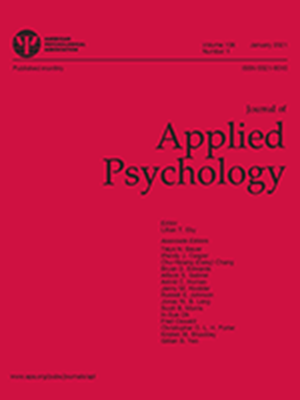From moral exemplar to underperformer? The double-edged sword of ethical leadership for leader in-role and extra-role performance.
IF 6.1
1区 心理学
Q1 MANAGEMENT
引用次数: 0
Abstract
Given the overall positive influence ethical leaders have on their followers' performance, the literature has largely assumed that ethical leadership also facilitates the performance of leaders themselves. We challenge this assumption by adopting a within-person perspective to reveal more nuanced relationships between distinct forms of daily ethical leadership and daily leader performance. Building on the affect theory of social exchange (Lawler, 2001), we develop a theoretical model that examines the diverging effects of daily promotion- and prevention-focused ethical leadership on daily leader performance through the reciprocal influence of followers' affective reactions. Specifically, we predict that whereas daily promotion-focused ethical leadership will elicit follower displayed gratitude toward the leader, daily prevention-focused ethical leadership will elicit follower displayed anger toward the leader. Downstream, we predict that follower displayed gratitude and anger will subsequently influence leaders' in-role and extra-role performance. We also explore how overall social exchange quality shapes the daily affective and behavioral dynamics between leaders and followers. Results from three studies using a multimethod approach provide convergent support for our model. Overall, this research offers both theoretical and practical insights about the potentially unexpected leader-centric consequences of ethical leadership. (PsycInfo Database Record (c) 2025 APA, all rights reserved).从道德模范到表现不佳?伦理领导对领导者角色内绩效和角色外绩效的双刃剑。
鉴于道德型领导对其下属绩效的总体积极影响,文献在很大程度上假设道德型领导也促进了领导者自身的绩效。我们挑战了这一假设,采用了个人视角来揭示不同形式的日常道德领导和日常领导者表现之间更微妙的关系。基于社会交换的情感理论(Lawler, 2001),我们建立了一个理论模型,通过追随者情感反应的相互影响,研究了日常促进和预防为重点的伦理领导对日常领导者绩效的不同影响。具体地说,我们预测日常以促进为中心的道德领导会引起追随者对领导者的感激,而日常以预防为中心的道德领导会引起追随者对领导者的愤怒。在下游,我们预测追随者的感恩和愤怒表现随后会影响领导者的角色内和角色外绩效。我们还探讨了整体社会交换质量如何影响领导者和追随者之间的日常情感和行为动态。使用多方法方法的三项研究结果为我们的模型提供了收敛性支持。总的来说,这项研究提供了关于伦理领导可能意想不到的以领导者为中心的后果的理论和实践见解。(PsycInfo Database Record (c) 2025 APA,版权所有)。
本文章由计算机程序翻译,如有差异,请以英文原文为准。
求助全文
约1分钟内获得全文
求助全文
来源期刊

Journal of Applied Psychology
Multiple-
CiteScore
17.60
自引率
6.10%
发文量
175
期刊介绍:
The Journal of Applied Psychology® focuses on publishing original investigations that contribute new knowledge and understanding to fields of applied psychology (excluding clinical and applied experimental or human factors, which are better suited for other APA journals). The journal primarily considers empirical and theoretical investigations that enhance understanding of cognitive, motivational, affective, and behavioral psychological phenomena in work and organizational settings. These phenomena can occur at individual, group, organizational, or cultural levels, and in various work settings such as business, education, training, health, service, government, or military institutions. The journal welcomes submissions from both public and private sector organizations, for-profit or nonprofit. It publishes several types of articles, including:
1.Rigorously conducted empirical investigations that expand conceptual understanding (original investigations or meta-analyses).
2.Theory development articles and integrative conceptual reviews that synthesize literature and generate new theories on psychological phenomena to stimulate novel research.
3.Rigorously conducted qualitative research on phenomena that are challenging to capture with quantitative methods or require inductive theory building.
 求助内容:
求助内容: 应助结果提醒方式:
应助结果提醒方式:


